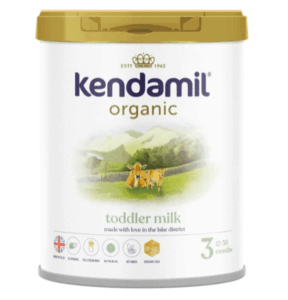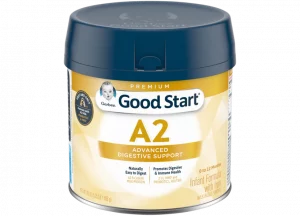This post may contain affiliate links. Please read my disclosure.
As if there weren't enough options yet, you may have come across a new addition in the milk aisle and formula shelves, or in your favorite baby formula online shop. A2 milk seems to be the newest hype. In this post I take a closer look at this type of milk, and provide with you the best A2 formula brands on the market, so you can decide if it's the best choice for your child.What Is A2 Milk?
Cow's milk contains a protein structure made up of mostly casein (about 80%) and whey (about 20%) . Whey is a simpler protein, whereas casein is a more complex protein, and takes longer to digest.
There are several types of casein proteins. The most common ones are A1 and A2 beta-casein protein. As the name suggests, A2 milk contains almost exclusively A2 milk protein and no A1 protein. Regular cow's milk contains both A1 and A2, although the proportions vary with different breeds.
The difference between the two beta casein variants A1 and A2 is small: They only differ from one another by one amino acid (out of more than 200 amino acids that make up the proteins).
How Is A2 Milk Produced?
Contrary to what many people believe, A2 protein milk is not produced synthetically. It is regular milk that is coming from a few specific breeds of cows. The cows are not genetically modified but produce this milk naturally.
Many decades ago, cows produced only milk with exclusively A2 beta casein. A1 beta casein was created via a mutation, and was passed on to other breeds and spread throughout the world. Over time, A1 became the presiding version of the protein.
Nowadays, there are still dairy farms where the cows exclusively produce A2 milk. Especially in parts of Asia, Africa and Southern Europe.
In the US, the A1 version of milk is most common (containing both A1 and A2 beta casein). This is why A1 milk is what we grow up drinking and what we see in dairy isles in the supermarkets.
A2 milk was made popular by a company founded in 2000 in New Zealand: The "A2 Milk Company". It was founded by a research scientist who studied the effects of A1 beta casein.
The A2 Milk Company uses DNA tests on their cows to ensure they only produce A2 milk, then they test the milk after production to make sure it does not contain A1 beta casein protein.
Benefits Of A2 Milk
A1 and A2 beta casein are digested differently. Explained as simply as possible: A1 protein produces a peptide called BCM-7 when it is digested. The intestines absorb this peptide. Some doctors and researchers have linked BCM-7 to stomach pains and discomfort similar to those caused by lactose intolerance (for example gas and bloating). A2 protein does not produce this peptide.
Some studies have shown that switching to A2 milk can relieve symptoms of discomfort related with the consumption of A1 milk.
Some studies have found that there is a link between the consumption of A1 protein and a higher risk of developing type 1 diabetes in children.
Other studies, however, have found no such correlation. We know that there is a positive correlation between babies consuming dairy and type 1 diabetes later on in life. But it is extremely difficult to determine which components of the milk cause this.
The same is true for A1 protein in correlation with heart disease: Some studies have found that there may be a correlation, while others showed the opposite.
In 2009, the European Food Safety Authority (EFSA) reviewed the potential health impact of beta casein protein and related peptides and found no sufficient evidence for the claim that milk containing A1 protein has a negative effect on health.
We can't say with certainty whether A2 milk is healthier or easier to digest. There is a lack of research and scientific evidence to support those claims.
A2 milk may have benefits, but the scientific evidence is not clear enough to make any definitive proclamations about positive health effects of A2 milk at this point. Additionally, most of the studies that have been conducted on A2 milk were funded by the A2 Milk Company and can't be considered unbiased.
A2 Milk In Baby Formula
Apart from the potential benefits discussed before, breast milk (as well as milk from other mammals such as goat, sheep, and camel) have mostly the A2 variant of beta casein. Therefore, this special A2 cows milk has a protein composition that is closer to breast milk than that of A1 milk, and could be more beneficial for your baby's health.
For premature infants who have an underdeveloped digestive system, A2 formula may be a good option since it will likely be gentler on their tummies.
When it comes to A2 milk formula, there are several organic infant formula options available. However, many A2 baby formula is not organic or non-GMO.
Before starting any new formula, be sure to consult your baby's doctor.
When purchasing an A2 Formula look for the following:
- Organic
- Non-GMO
- DHA and ARA (not from hexane extraction)
- No Added Sugars
- No Maltodextrin
- No Palm Oil
- No Soy
Holle A2 Formula
The popular Swiss baby formula brand Holle has just extended its product range to A2 formula. As per usual with Holle, the ingredients are all high quality, sourced from organic farming and are GMO, hormone, and pesticide free. Holle A2 formula is fortified with the optimal blend of vitamins and minerals and adjusted in macro-nutrient contents to fit the age of your baby. This premium infant formula is made with A2 cow's milk.
Skimmed A2 Milk 1, Whey Product (Partially Demineralized Whey Powder), Vegetable Oils (Palm Oil 2, Rapeseed Oil, Sunflower Oil), Lactose, Calcium Carbonate, L-Tyrosine, Potassium Chloride, Fish Oil 3, Magnesium Chloride, M. Alpina Oil**, Calcium Chloride, Calcium Hydroxide, Choline, Sodium Chloride, L-Tryptophan, Inositol, Ferrous Lactate, Vitamin C, Zinc Sulfate, Vitamin E, Niacin, Pantothenic Acid, Copper Sulfate, Vitamin A, Vitamin B1, Manganese Sulfate, Vitamin B6, Potassium Iodate, Folic Acid, Sodium Selenate, Vitamin K, Vitamin D, Biotin.
Ingredients to Note:
Overall, Holle uses quality organic ingredients. However, there are two ingredients to note, palm oil, and fish oil. While palm oil is safe for baby to consume, and is used often in formulas as a primary source of fat, it does raise some ethical concerns with regard to how it is sourced. In addition, palm oil may decrease calcium absorption. As a result calcium is added to formula to compensate so that your baby is getting all the calcium that they need. In addition, if you provide your baby with a formula that has prebiotics and/or probiotics, this will help with calcium absorption and improve baby's health by protecting against immune problems.
Another ingredient to take note of is fish oil. In Holle, fish oil is added to provide DHA, Omega-3 fatty acids. In Europe, it is required to have DHA in formula. However, there has been some controversy about fish oil. Some experts say that infants cannot process fish oil, which in turns leads to vomit and milk back-up. There are other ways to add DHA without the need to use fish oil. M. alpina oil and c. cohnii oil which is extracted from algae is a plant source of DHA, and it's extracted using water, not hexane.
Goat Milk A2 Formula
Goat milk is easier to digest than cow milk and the A2 milk makes the formula easier for infants to absorb. The added HMOs make this Goat milk formula different than the other options on the market as well.

Other Organic A2 Cow's Milk Formulas

FAQs
How do you prepare A2 formula?
A2 formula is prepared similar to regular cows milk formula. Before you prepare any baby formula, makes ure to wash hands thoroughly. Then you'll just be mixing the required amount of powder in water that has been boiled and shake thoroughly. To ensure maximum safety of the product, always closely follow the instructions on the back of the can or box. Serve prepared formula immediately at room temperature.
Can I give my baby A2 formula if they have a cow's milk allergy?
Babies that have been diagnosed with cow milk allergy can't consume A2 milk formula. Even though A2 milk has a different protein structure, it will most likely cause the same reactions.
Can I give my baby A2 formula if they are lactose intolerant?
A2 milk is not lactose free. Lactose intolerant babies will show the same reactions to A2 milk as they do with A1. Some symptoms of discomfort similar to lactose intolerance may be relieved with A2 milk. This can be the case if the symptoms are not actually caused by lactose but by the BCM-7 peptide.
Is A2 formula good for colic?
If your child suffers from colic and it is due to digestive discomfort, A2 formula could help relieve some of that discomfort, and in turn improve the symptoms of colic.
Final Thoughts: Is A2 Formula Milk Better?
Regular cow's milk formulas contain the essential micro and macronutrients for growth and development. A2 milk formulas are an alternative to regular cow's milk formula. It may be a good option if your baby is experiencing some discomfort with regular milk based formulas.
Sources
I hope this guide to A2 formula has answered your questions, and helped you make an informed choice about the type of formula you'd like to start your baby on.

